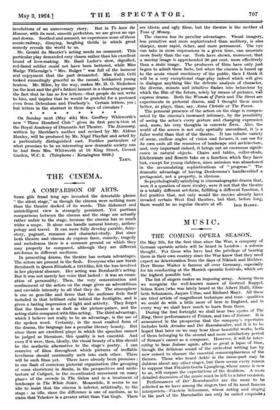THE CINEMA.
A COMPARISON OF ARTS.
SOME glib fraud long ago invented the detestable phrase " the silent stage," as though the cinema were nothing more than the theatre docked of its words. This dishonest and unintelligent view is strangely persistent. Yet partisan comparisons between the cinema and the stage are actually rather unfair to the stage, because the cinema has so much wider a scope. It alone can handle natural history, anthro- pology and travel. It can more fully develop parable, fairy- story, pageant, romance and character-study. But since both theatre and cinema do express farce, comedy, tragedy and melodrama there is a common ground on which they may properly be compared, although they are different art-forms in different mediums.
In presenting drama, the theatre has certain advantages. The actors are present in the flesh. Everyone who saw Sarah Bernhardt in Queen Elizabeth, a 1918 film, felt the loss involved in her physical absence. Her acting was Bernhardt's acting. But it was not merely her voice that lacked : it was an eman- ation of personality. Then, the very concentration and confinement of the actors on the stage gives an adventitious and enviable intensity to all that they do. The atmosphere is one so gem-like and fierce that the audience feels itself included in that brilliant cube behind the footlights, and is given a lasting impression of light and activity. They forget that the theatre is as dark as the picture-palace, and the acting static compared with film-acting. The third advantage, which I believe not really to be an advantage, is the use of the spoken word. Certainly, in the most exalted form of the drama, the language has a peculiar literary beauty. But since there are excellent plays in which the speeches cannot be judged as literature, this quality is not essential. And even if it were, then, ideally, the visual beauty of a film should be the aesthetic alternative to the stage's poetry. I can conceive of films throughout which 'pictures of ineffable loveliness should continually melt into each other. There will be such films yet. There have already been promises : in one flash of conscious pictorial organization (the grouping of sonic choristers) in Rosita, in the perspectives and archi- tecture of Caligari, in the co-ordinated movement on many planes of the crowds in The Golem and in a treatment of landscape in The While Sister. Meanwhile, it seems to me idle to insist that the cinema is inferior, artistically, to the stage : as idle, since the difference is one of medium, as to claim that Tchekov is a greater artist than Van Gogh. There
are idiotic and ugly films, but the theatre- is the mother of Tons of Money.
The cinema has its peculiar advantages. Visual imagery, less primitive and more sophisticated than auditory, is also sharper, more rapid, richer, and more permanent. The eye can take in more impressions in a given tune, can associate more freely than the ear. Tests have shown, moreover, that a moving image is apprehended 20 per cent. more effectively than a static image. The producers of films have only just begun to admit these facts, but when the cinema is tuned up to the acute visual machinery of the public, then I think it will be a very exceptional stage-play indeed which will give in dialogue anything like the delicate analysis of character, the diverse, minute and intuitive flashes into behaviour by which the film of the future, solely by means of pictures, v.al express drama. Both the Woman of Paris and The Street are experiments in pictorial drama, and I thought them much better, as plays, than, say, Anna Christie or The Forest.
The personal presence of the actors on the stage is compen• sated by the cinema's increased intimacy, by the possibility of seeing the actor's every gesture and changing expression and, more, his very thoughts in concrete form. Also, the world of the screen is not only spatially unconfined, it is a fuller world than that of the theatre. It has infinite variety of scene, endless angles of vision and focuses, it can use for its own ends all the resources of landscape and architecture, and, very important indeed, it brings out an enormous signifi- cance in natural objects. Chairs and tables, collar-studs, kitchenware and Bowers take on a function which they have lost, except for young children, since animism was abandoned in the accumulating sophistication of " progress." The dramatic advantage of having Desdemona's handkerchief a protagonist, not a property, is obvious.
So psychologically satisfying is cinematographic drama that, were it a question of mere rivalry, were it not that the theatre is a totally different art-form, fulfilling a different function, I feel positive that, not only would the movies already have invaded certain West End theatres, but that, before long, there would be no regular theatre at all. laze BARRY.














































 Previous page
Previous page